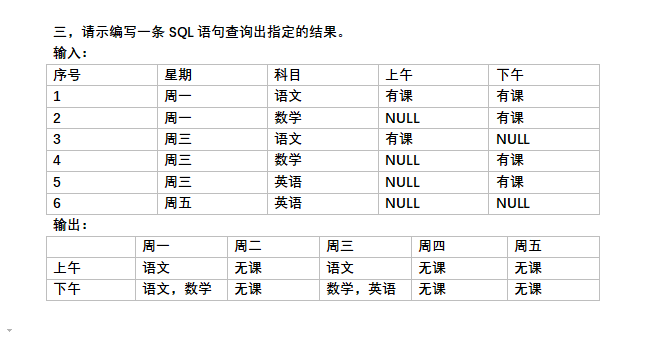可以将文章内容翻译成中文,广告屏蔽插件可能会导致该功能失效(如失效,请关闭广告屏蔽插件后再试):
问题:
I have a Map that has strings for both keys and values.
Data is like following:
\"question1\", \"1\"
\"question9\", \"1\"
\"question2\", \"4\"
\"question5\", \"2\"
I want to sort the map based on its keys. So, in the end, I will have question1, question2, question3....and so on.
Eventually, I am trying to get two strings out of this Map.
- First String: Questions ( in order 1 ..10)
- Second String: Answers (in the same order as the question)
Right now I have the following:
Iterator it = paramMap.entrySet().iterator();
while (it.hasNext()) {
Map.Entry pairs = (Map.Entry) it.next();
questionAnswers += pairs.getKey() + \",\";
}
This gets me the questions in a string but they are not in order.
回答1:
Short answer
Use a TreeMap. This is precisely what it\'s for.
If this map is passed to you and you cannot determine the type, then you can do the following:
SortedSet<String> keys = new TreeSet<>(map.keySet());
for (String key : keys) {
String value = map.get(key);
// do something
}
This will iterate across the map in natural order of the keys.
Longer answer
Technically, you can use anything that implements SortedMap, but except for rare cases this amounts to TreeMap, just as using a Map implementation typically amounts to HashMap.
For cases where your keys are a complex type that doesn\'t implement Comparable or you don\'t want to use the natural order then TreeMap and TreeSet have additional constructors that let you pass in a Comparator:
// placed inline for the demonstration, but doesn\'t have to be a lambda expression
Comparator<Foo> comparator = (Foo o1, Foo o2) -> {
...
}
SortedSet<Foo> keys = new TreeSet<>(comparator);
keys.addAll(map.keySet());
Remember when using a TreeMap or TreeSet that it will have different performance characteristics than HashMap or HashSet. Roughly speaking operations that find or insert an element will go from O(1) to O(Log(N)).
In a HashMap, moving from 1000 items to 10,000 doesn\'t really affect your time to lookup an element, but for a TreeMap the lookup time will be about 3 times slower (assuming Log2). Moving from 1000 to 100,000 will be about 6 times slower for every element lookup.
回答2:
Assuming TreeMap is not good for you (and assuming you can\'t use generics):
List sortedKeys=new ArrayList(yourMap.keySet());
Collections.sort(sortedKeys);
// Do what you need with sortedKeys.
回答3:
Using the TreeMap you can sort the map.
Map<String, String> map = new HashMap<>();
Map<String, String> treeMap = new TreeMap<>(map);
for (String str : treeMap.keySet()) {
System.out.println(str);
}
回答4:
回答5:
If you already have a map and would like to sort it on keys, simply use :
Map<String, String> treeMap = new TreeMap<String, String>(yourMap);
A complete working example :
import java.util.HashMap;
import java.util.Set;
import java.util.Map;
import java.util.TreeMap;
import java.util.Iterator;
class SortOnKey {
public static void main(String[] args) {
HashMap<String,String> hm = new HashMap<String,String>();
hm.put(\"3\",\"three\");
hm.put(\"1\",\"one\");
hm.put(\"4\",\"four\");
hm.put(\"2\",\"two\");
printMap(hm);
Map<String, String> treeMap = new TreeMap<String, String>(hm);
printMap(treeMap);
}//main
public static void printMap(Map<String,String> map) {
Set s = map.entrySet();
Iterator it = s.iterator();
while ( it.hasNext() ) {
Map.Entry entry = (Map.Entry) it.next();
String key = (String) entry.getKey();
String value = (String) entry.getValue();
System.out.println(key + \" => \" + value);
}//while
System.out.println(\"========================\");
}//printMap
}//class
回答6:
Just use TreeMap
new TreeMap<String, String>(unsortMap);
Be aware that the TreeMap is sorted according to the natural ordering of its \'keys\'
回答7:
Provided you cannot use TreeMap, in Java 8 we can make use of toMap() method in Collectorswhich takes following parameters:
- keymapper: mapping function to produce keys
- valuemapper: mapping function to produce values
- mergeFunction: a merge function, used to
resolve collisions between values associated with the same key
- mapSupplier: a function which returns a new, empty Map into which the
results will be inserted.
Java 8 Example
Map<String,String> sample = new HashMap<>(); // push some values to map
Map<String, String> newMapSortedByKey = sample.entrySet().stream()
.sorted(Map.Entry.<String,String>comparingByKey().reversed())
.collect(Collectors.toMap(Map.Entry::getKey, Map.Entry::getValue, (e1, e2) -> e1, LinkedHashMap::new));
Map<String, String> newMapSortedByValue = sample.entrySet().stream()
.sorted(Map.Entry.<String,String>comparingByValue().reversed())
.collect(Collectors.toMap(Map.Entry::getKey, Map.Entry::getValue, (e1,e2) -> e1, LinkedHashMap::new));
We can modify the example to use custom comparator and to sort based on keys as:
Map<String, String> newMapSortedByKey = sample.entrySet().stream()
.sorted((e1,e2) -> e1.getKey().compareTo(e2.getKey()))
.collect(Collectors.toMap(Map.Entry::getKey, Map.Entry::getValue, (e1,e2) -> e1, LinkedHashMap::new));
回答8:
This code can sort a key-value map in both orders i.e. ascending and descending.
<K, V extends Comparable<V>> Map<K, V> sortByValues
(final Map<K, V> map, int ascending)
{
Comparator<K> valueComparator = new Comparator<K>() {
private int ascending;
public int compare(K k1, K k2) {
int compare = map.get(k2).compareTo(map.get(k1));
if (compare == 0) return 1;
else return ascending*compare;
}
public Comparator<K> setParam(int ascending)
{
this.ascending = ascending;
return this;
}
}.setParam(ascending);
Map<K, V> sortedByValues = new TreeMap<K, V>(valueComparator);
sortedByValues.putAll(map);
return sortedByValues;
}
As an example:
Map<Integer,Double> recommWarrVals = new HashMap<Integer,Double>();
recommWarrVals = sortByValues(recommWarrVals, 1); // Ascending order
recommWarrVals = sortByValues(recommWarrVals,-1); // Descending order
回答9:
Using Java 8:
Map<String, Integer> sortedMap = unsortMap.entrySet().stream()
.sorted(Map.Entry.comparingByKey())
.collect(Collectors.toMap(Map.Entry::getKey, Map.Entry::getValue,
(oldValue, newValue) -> oldValue, LinkedHashMap::new));
回答10:
In Java 8
To sort a Map<K, V> by key, putting keys into a List<K>:
List<K> result = map.keySet().stream().sorted().collect(Collectors.toList());
To sort a Map<K, V> by key, putting entries into a List<Map.Entry<K, V>>:
List<Map.Entry<K, V>> result =
map.entrySet()
.stream()
.sorted(Map.Entry.comparingByKey())
.collect(Collectors.toList());
Last but not least: to sort strings in a locale-sensitive manner - use a Collator (comparator) class:
Collator collator = Collator.getInstance(Locale.US);
collator.setStrength(Collator.PRIMARY); // case insensitive collator
List<Map.Entry<String, String>> result =
map.entrySet()
.stream()
.sorted(Map.Entry.comparingByKey(collator))
.collect(Collectors.toList());
回答11:
List<String> list = new ArrayList<String>();
Map<String, String> map = new HashMap<String, String>();
for (String str : map.keySet()) {
list.add(str);
}
Collections.sort(list);
for (String str : list) {
System.out.println(str);
}
回答12:
We can also sort the key by using Arrays.sort method.
Map<String, String> map = new HashMap<String, String>();
Object[] objArr = new Object[map.size()];
for (int i = 0; i < map.size(); i++) {
objArr[i] = map.get(i);
}
Arrays.sort(objArr);
for (Object str : objArr) {
System.out.println(str);
}
回答13:
In Java 8 you can also use .stream().sorted():
myMap.keySet().stream().sorted().forEach(key -> {
String value = myMap.get(key);
System.out.println(\"key: \" + key);
System.out.println(\"value: \" + value);
}
);


